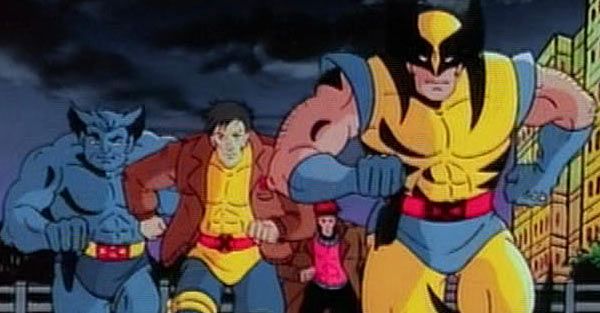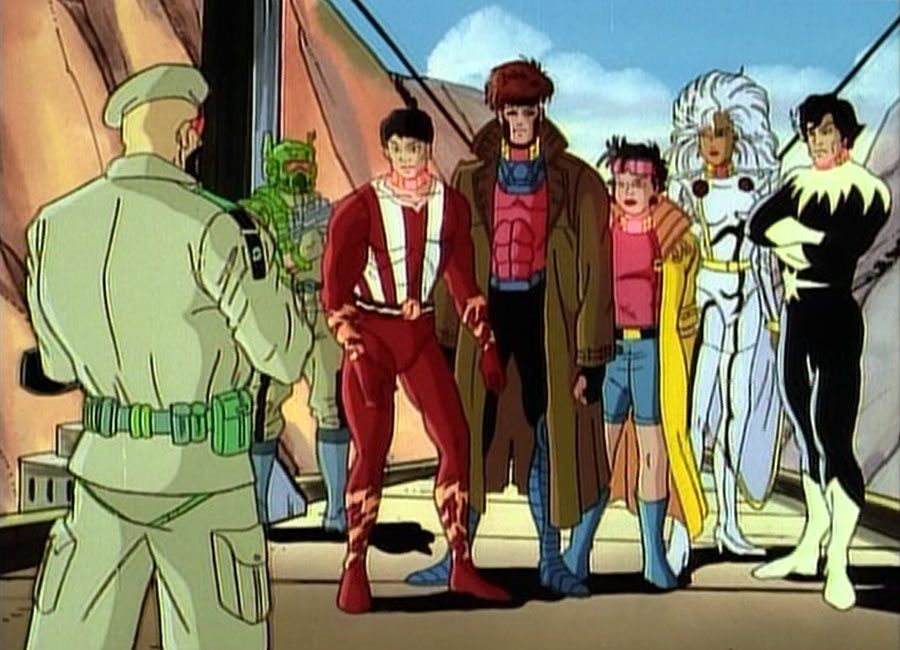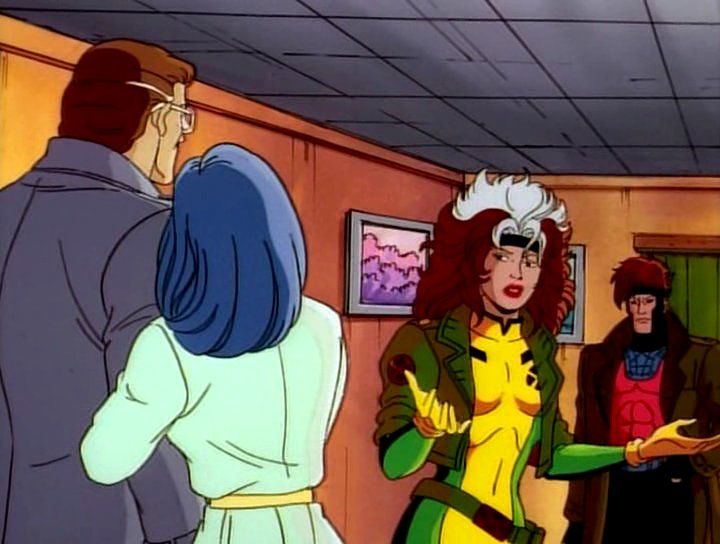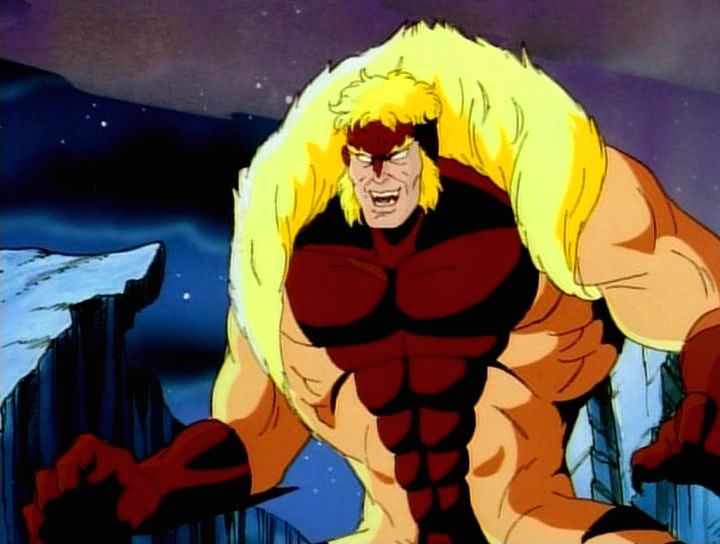Regular readers of this column know that I'm about as big of an X-Men fan as they come, so it should come as no surprise that the new trailer for "X-Men: Days of Future Past" has inspired me to write this week's JAM. The trailer was bigger and better than the first one we saw in October, and it did a fine job of reminding me that, oh yeah, Bryan Singer is a real director with a keen eye for setting up dynamic shots. Also, Iceman rode on an ice slide. That's enough for me. I'm happy. Let's call it a day.
Of course, all of my previous complaints about the film still stand -- but I'm not going to get into them here. I hate being a buzzkilljoy about this movie. I do think I have valid concerns about where the X-Men franchise is going, but I just don't feel like spending 1000 words breaking it all down again, especially in response to another trailer. I'll hold off on further commentary until I see the movie. Instead, I want to talk about the perfect X-Men adaptation that already exists.
Yes, I am talking about the first season of Fox's "X-Men" cartoon from the 1992-1993 television season. And yes, I am 29 years old, meaning right in the age range sweet spot of adults with an overly nostalgic view of this show. And yes, the show did introduce me to the X-Men. I'm incredibly biased towards this show, but I don't think that disqualifies me from x-tolling the show's virtues (I nailed that pun, by the way).
I do recognize that the show suffered from less than stellar animation, utilized some downright melodramatic voice acting, and had plot holes you could fly the Blackbird through. I respond to all of those complaints with a heartily exasperated "so what?" "G.I. Joe" and "Teenage Mutant Ninja Turtles," shows that I consider to be "X-Men's" action adventure forefathers, suffered from one-to-three of those very same problems during their time on the air. I'm getting those gripes out of the way up top, because I'm not here to focus on the show's negatives. Don't I want to write something positive, instead? Does a mall babe eat chili fries?
"X-Men" hit me at a time when I was just ready to experience a slightly more mature level of storytelling. "X-Men" was the first show -- definitely the first cartoon -- that I watched that employed real serialized storytelling. Every show I had watched up until that point, from Saturday morning network cartoons to Nickelodeon sitcoms to whatever passengers hopped on the USA Cartoon Express, all told done-in-one stories. I did not know what it was like to have appointment television, a show that I could not miss a week of because I could potentially miss something huge that would have ramifications. No matter where I was, Saturday at 10 a.m. became like my whenever-all-of-you-watched-"True Detective." Despite leaving them filled with charming plot holes (they left Jubilee alone to watch over Sabretooth, you guys!), the writers behind "X-Men" were way more ambitious than they needed to be.
That's why, for me, "X-Men's" first season stands proudly as the best adaptation the mutants have ever had. My nostalgia may have led me to that conclusion, but my admittedly biased adult brain has backed it up with facts. Over the course of its first thirteen episodes, the "X-Men" cartoon explores the minority metaphor from every possible angle, pulling storylines from disparate parts of the comic's thirty year run together to form a cohesive and compelling longform narrative that feels like a fresh take while remaining true to the spirit of the comics. Yeah, I'm being serious.
The X-Men cannot be divorced from politics and still feel like the X-Men. Instead of just presenting the mutants as an adventure team deployed to stop evil mutants running amok -- which is kinda what the failed '80s pilot "Pryde of the X-Men" sets up -- the '90s show dove head first into the persecuted minority angle and did not come up for air in thirteen episodes. Maybe that's because the show debuted in the early '90s, when politics and pop culture merged into one environment saving/sexual harassment fighting/AIDs awareness raising behemoth. The "X-Men" burst onto Saturday morning television with a message of tolerance and understanding, delivered via giant purple robots hunting a scrappy teenage girl with a major 'tude just because she was a mutant. Eight-year-old me had never heard of super heroes that were hated and feared by those they were sworn to protect, and eight-year-old me did not yet know about the real world bigotry that inspired the X-Men's metaphor. The blunt handling of this nuanced topic (the phrase "people fear what they do not understand" was said twice in the first two episodes) made it easy for children to grasp.
The mutant-hunting Sentinels formed the through line for the first season; they appeared in the two-part opener and then returned at the halfway point and finale. Magneto's a solid villain, one of the greatest villains ever, but by making the Sentinels the show's primary antagonists, the X-Men could fight the very idea of persecution -- albeit a persecution that walks and shoots lasers. The Sentinels are a stand-in for the idea of intolerance; they can't be reasoned with like the Morlocks and they aren't sympathetic like Magneto. They are merciless, overwhelming, weaponized hatred, and they terrorize and terrify the X-Men appropriately.
"X-Men's" first season was not content to merely depict one, Sentinel-covered side of mutant politics. Immediately following the opening one-two punch, we simultaneously meet Magneto and Sabretooth. Both villains represent other mutant ideologies, ones vastly different from the tolerance preached by Charles Xavier. Sabretooth's a nihilist -- he had no larger purpose and caused trouble wherever money or petty revenge led him. He was the growling mutant monster that terrified humans thought lived in their closets, void of compassion and thirsty for blood. Magneto's threat to humanity was purely ideological and, in its own way, rational. The cartoon painted Magneto's childhood in a concentration camp in broad strokes, but we still got insight into Magneto's rage. Everything he did, he did because his family was murdered for being different. It's hard to argue with him, up until the point he started launching nukes and attacking chemical plants.
The show then shifts its focus downwards to the Morlocks, and upwards to Apocalypse, two adversaries that represented opposing stances on mutant self worth. Because of their persecution, the Morlocks gave up on comfort and sunlight, opting instead to form a new society in the dark below Manhattan. Apocalypse, on the other hand, turned his people's persecution into the biggest confidence boost around. He knew he was awesome, and was willing to kill everyone else to prove it. The X-Men again found themselves caught in the middle of these two extremes, as they often did. Every villain the X-Men came up against in season one spoke specifically to the show's central theme. Except Juggernaut. Even I thought that was a weird episode.
After spending most of the season showing us the different types of mutants and mutant ideologies that exist, we got the "Days of Future Past" two-parter. Humanity's war with mutants and the deployment of the Sentinels led to a ruined America and a graveyard filled with dead X-Men. Pretty bleak for a Saturday morning cartoon! This all came to be because of a political assassination and reactionary legislation -- again, more stuff usually reserved for primetime soaps. Kids were not only shown that rampant bigotry leads to a post-apocalyptic nightmare for everyone, they were also shown that preventative measures have to be taken by everyone.
Then we get to "The Final Decision," the season finale that I believe makes this batch of episodes the best adaptation the X-Men have ever had. The Sentinels returned, now in defiance of their masters and plotting to replace every world leader's brain with a Sentinel-controlled computer. Crazy plot, sure, but pretty big stakes. Senator Kelly's been kidnapped by the Sentinels and the X-Men have to decide whether they should risk their lives to save a man that hates them from their most persistent and deadly foes. This is the entire series, the entire concept of the X-Men, right here. A lesser show would not have spent the previous twelve episodes crafting characters with clearly defined personalities and opinions, and a lesser show would not waste time with making the heroes debate about whether or not to save a senator's life. All of the X-Men deciding to go on that mission together, after all the hardships they've gone through up to that point, feels like the biggest victory of the season.
The X-Men films have done a lot of the same things accomplished by the cartoon a decade prior. They too have explored the mutant metaphor in exciting and thoughtful ways. The main thing missing in the X-Men films, though, is a scene like the one in "The Final Decision." The X-Men films are so preoccupied with Wolverine, Magneto, and Professor X that a scene like that one in the War Room could never even take place, because I have yet to get a chance to really know any character outside of that trilogy of old men -- at least not as much I did in the animated series.
After thinking about the first season of "X-Men" like this, I think I can finally lighten the burden I've placed on "X-Men: Days of Future Past" and my favorite characters' big screen franchise. I want them to be great movies, and I want them to be good adaptations of things I hold dear about their source material, but I don't think they have to be. I already have that. It already exists, and I've already seen it. It's what made me love the X-Men in the first place. It's that cartoon, and -- to quote Rogue in "Night of the Sentinels" part two -- "ain't that enough?"
Brett White is a comedian living in New York City. He co-hosts the podcast Matt & Brett Love Comics and is a writer for the comedy podcast Left Handed Radio. His opinions can be consumed in bite-sized morsels on Twitter (@brettwhite).




